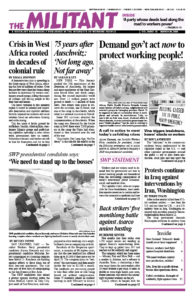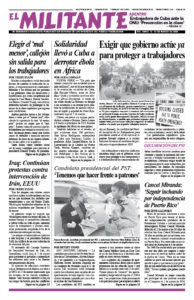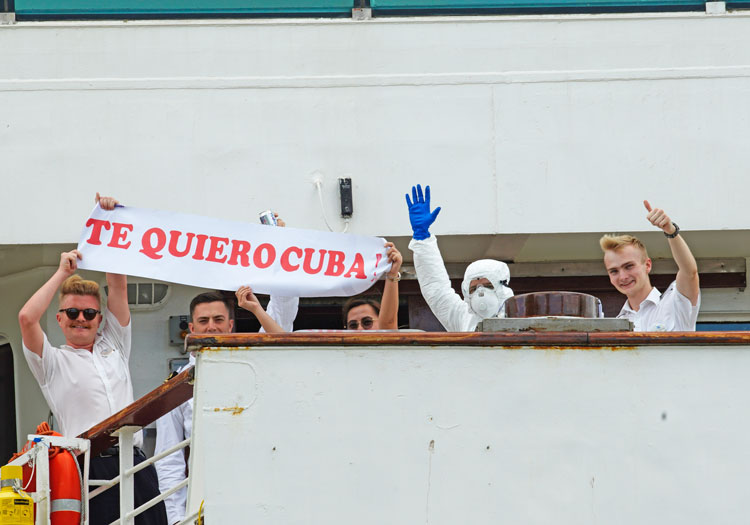The “solutions” to the coronavirus epidemic being implemented by the capitalist rulers in the U.S. — and other capitalist governments around the globe — are to shut down production, slash jobs and tear apart the social fabric for working people. The rulers are imposing isolation on hundreds of millions and curbing our political rights.
They have failed to provide the testing, the treatment and the mass production of medicines that we need to fight to mitigate, and then find a vaccine to halt, the spread of the new virus and drugs that can cure it. In the face of this crisis, caused by the bosses’ organization of society around their drive for profits, the rulers continue to leave working people more than ever on their own.
No government — with the exception of revolutionary Cuba — has mobilized resources and organized working people to combat the spread of the virus. None is producing what is urgently needed, from medical equipment to hospital beds or fulfilling food and housing needs. Instead, workers and farmers face mass layoffs and growing shortages as industries and shops, small and large, are shuttered.
Working people have the capacities to resolve these shortages if we can use our collective power to force the government to do so, regardless of the capitalist rulers’ greed for profit.
The woefully inadequate number of hospital beds in the U.S. is a disaster, not to mention the shortages of respirators, ventilators, test kits and drugs that can alleviate some of the threats of the virus. Hospitals are running out of masks, gowns and other equipment essential to protect workers.
All of these closures and shortages have the same cause — the bosses carefully calculate which facilities generate a large enough profit and get rid of the rest. Their class’s accumulation of riches takes precedence over the health and lives of working people.
The New York City government ordered a monthlong closure of the public school system March 16 that hit over 1 million students. This places the responsibility for child care, and for two more meals a day, on the backs of working-class families already facing layoffs and loss of benefits.
Anti-social hoarding and black-market price gouging exacerbate the problems workers face in finding and affording basic necessities.
With the growing season coming, farmers face greater problems in getting fertilizer and seed, and can’t get enough workers, with the borders locked down.
In fact, if you open the newspaper or turn on the TV, they’re crammed with ads for things workers know are impossible, from a trip to Disneyland, a restaurant to eat out at or job-wanted ads.
Lockdowns restrict political space
In San Francisco, Alameda and five other counties across northern California authorities have issued “shelter-in-place” orders — threatening to fine or imprison anyone outside for any reason the authorities deem “nonessential.”
Wanda Vázquez, governor of Puerto Rico, has imposed a 9 p.m. to 6 a.m. curfew, enforceable with fines or jail.
There are similar anti-working-class restrictions worldwide. The Ukrainian government banned gatherings of more than 10 people. Several thousand people defied the ban March 14, however, to protest President Volodymyr Zelensky’s decision to discuss concessions with Moscow-backed separatist forces in eastern Ukraine.
“What the Ukrainian government is doing in terms of the national interest is more dangerous than the virus,” Yulia Kovtun told the New York Times.
And the social crisis unfolding has just begun. The dog-eat-dog competition for profit by capitalist bosses, protected by their governments, along with the crisis of the for-profit “health care” system, pose the question of what must be done.
One key question is whether there is widespread testing for the virus. The U.S. rulers, like most capitalist governments, were utterly unprepared to do testing, and today, weeks after the outbreak developed, allow testing only when someone has symptoms of the disease.
In contrast to the higher mortality rates in the U.S., Italy and elsewhere, so far it is only 0.8% in South Korea. Testing for the virus there is free for anyone with symptoms and only those infected with the disease have been quarantined. Drive-through stations providing test results in hours have enabled over a quarter of a million people to be tested since January. Suspected cases are traced and treated.
Working-class road forward
As long as the bosses and their government call the shots, workers need to find ways to organize and fight for what is needed — government-guaranteed testing; adequate supplies of medical equipment and care for everyone who needs it; long-term weekly government-guaranteed pay; and relief for all who need it.
Working people have proven they have the capacity to fight, push back the bosses and win. Rail workers at Canadian National Railway recently waged an eight-day strike over safety, work schedules and conditions. Walmart workers in Miami successfully won a two-year fight for cashiers, who have to stand all day, to have mats to cushion the concrete floors. In Los Angeles, some Walmart workers are in a constant fight to retain their newly won right to stools to sit on. There are many shop-floor battles like these over wages and working conditions that go unreported today.
We know from history how social struggles like the Black-led civil rights movement overturned Jim Crow segregation, and how Cuban workers and farmers overthrew the U.S.-backed Fulgencio Batista dictatorship in Cuba in 1959, taking political power into their own hands. It’s no accident that Cuba today is where the government, the unions and other mass organizations of the people have been successful in fighting the virus by making sure no one on the island is left on their own.


